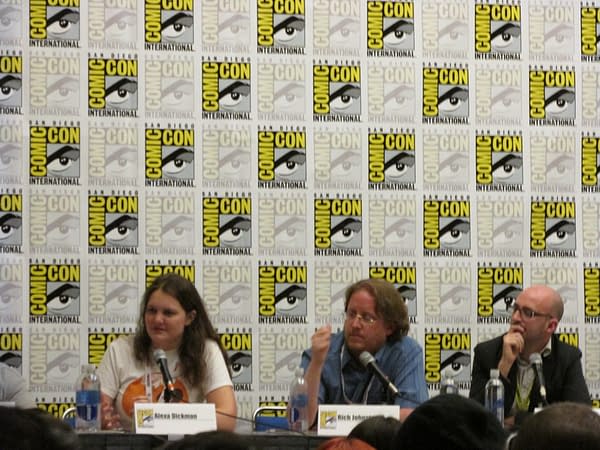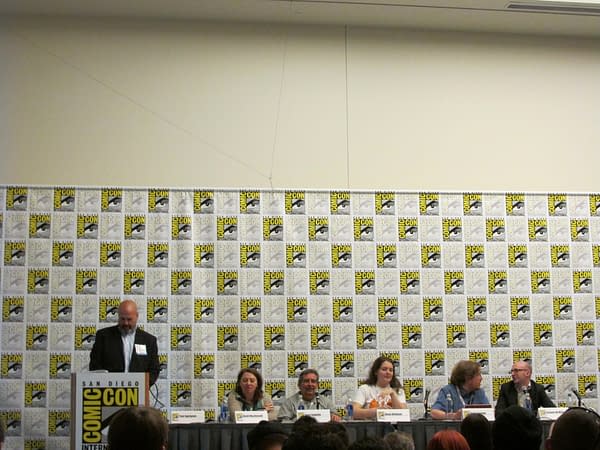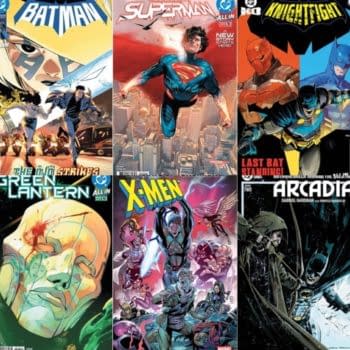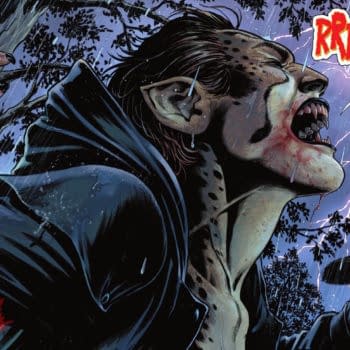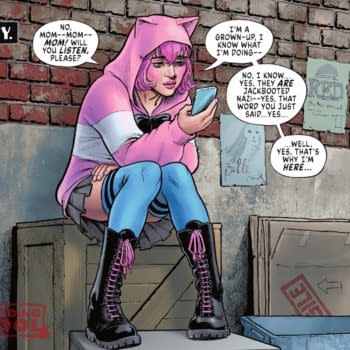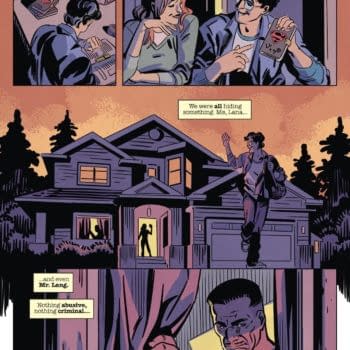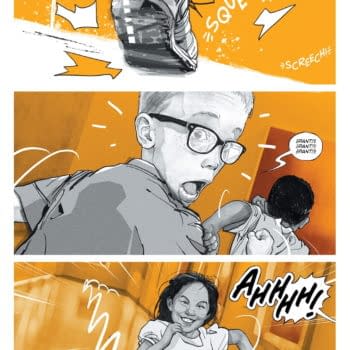Posted in: Comics | Tagged: Comics, heidi macdonald, Rich Johnston, sdcc
Feuding Turns Into Commiseration At SDCC's Comics Blogging Panel
The "Comics Blogging Panel" at SDCC on the first evening of panels at the con promised a "no holds barred" discussion of the ethics of comics blogging, ranging from news on comics blogs to more personal and idiosyncratic writing about the realm of comics production. Tom Spurgeon (The Comics Reporter) moderated and participated in the panel with Heidi MacDonald (The Beat: Newsblog of Comics Culture), our own Rich Johnston of Bleeding Cool, Tony Isabella (Tony's Tips), Alexa Dickman (Ladies Making Comix) and Graeme McMillan (Wired, THR, Newsarama, Comics Alliance, Spinoff, Fanboy Rampage). Spurgeon proved an excellent host to the proceedings due to his direct, often humorous line of questioning that nevertheless tackled a lot of the issues that fans and writers alike bat back and forth trying to make sense of the wild west mentality of the internet when it comes to writing about comics.
Spurgeon's "survey question" about how long each panellist had been in the biz of talking about comics online yielded some impressive history, stretching back to the early days of the internet. Most of the panellists had been involved for 10 or more years, perhaps even a total of over 20, going back to Compuserve and forum posting, a time when talking about comics was simply a heated discussion among a far-flung but relatively small coterie of dedicated fans, an era, admittedly, of "horrible fights" as MacDonald said. Another survey, a little more probing, dealt with how much of an income semi-pro bloggers manage to make from their sites. MacDonald said half of her income derives from The Beat, half for Spurgeon, and a singular "all" from Rich Johnston. It's no secret that blogging is not usually a profitable business, as the survey confirmed. Among the panellists it was pretty evenly divided among those who maintain sole blogging roles on their sites and those who now oversee other writers as well, but all said that they use social media in some capacity to help promote their work.
Having established the basic situation of these blogs, Spurgeon dove into questions that had been sent to his site in the lead-up to the con for consideration from readers. The first was a thorny one, probing whether the bloggers felt that they had to use words like "exclusive" when handling promo material from publishers and whether that was simply a tool to drive up comic news site traffic. MacDonald said she was wary of using the term "exclusive" since it could be somewhat of a throwaway term, and isn't particularly appealing to her as an approach to news. Most bloggers on the panel were ambivalent, in fact, to that kind of self-generated hype from companies. There's no doubt that using things like celebrity names in article titles does yield bigger traffic for comic sites, posing the question whether or not reaching too far from traffic waters down a comic news site or blog's content in a kind of devil's bargain for success, but at some cost.
Perhaps most controversial, and even a little uncomfortable, was the question of writer pay on comics blogs, how much or little reaches the contributors aside from the owner/founder of the site itself as many sites expand their writing pool. A caveat to the question included whether not paying the writers and yet arguing about the state of creator pay in comics renders a news site "hypocritical" in their own practise versus the subject of their content. Spurgeon was quite transparent about the fact that he does pay guest bloggers, and his rate was surprising to just about everyone in the room at 100 dollars per article. He, however, considers this rate very low compared to the heyday of writing in the 1990's and therefore refuses to allow many contributors to come aboard. Johnston was more circumspect, noting that some blog contributors are paid depending on their role maintaining a blog site, whereas some are not paid, and are content with "promoting their work" via blogs. A common phenomenon which he referenced was the kind of "exchange" comics journalists often accept whereby they get press passes to big comic cons or other events in return for their coverage.
MacDonald had a lot to say on the subject, but was definitive about the fact that writers on The Beat are not paid for their work, a state which she's not comfortable with, but continues to seek a better model. She admitted that it can be exploitative to take on writers in a no-pay situation, but that the old "exposure" argument does hold some water as writers seek to establish themselves and then move on to paying jobs of their own. Whether or not the bloggers felt that this compromised their ethics when talking about work for hire and a lack of creator rights in comics seemed balanced against the fact that many sites allow a writer to retain "rights" to their work, something that many paid magazines do not allow. The fact that no one is "forcing anyone to do anything", McDonald said is also a mitigating factor, but it doesn't quite answer the question either of whether encouraging writers to work for free really squares the balance when comics news sites are often vocally concerned with a similar problem in freelance or start-up comics projects.
"Everybody sucks now", Spurgeon concluded, citing the fact that even Rolling Stone pays its bloggers less than what he considers acceptable. "Someone's making money out there but it just isn't any of the writers", he added, feeling that he might as well "beat" the subject to "death" to make the point that there's plenty wrong with comics blogging, and journalism in general right now. Isabella added that in his long history of writing, he'd been "screwed over" many times "by the suits" and hoped to share his experience, at least, to better inform younger writers.
This seemed like a good segue to introduce some hot topics in comics discussions both on blogs and in social gatherings, such as the state of creator rights in comics, the progress, or lack thereof in gender issues in comics, and the lamentable state of financial stability and care for comics creators as they enter old age after an often famed but suddenly disposable career. Spurgeon's take on these issues was to urge writers to "write realistically" in their work about things like financial issues to raise awareness and not simply to turn a blind eye. Even if solutions are not simple or forthcoming, ignoring them is part of the problem. He concluded in quite manageable sound-bytes, rounding up the evening's findings, "Suits are evil; We don't understand gender issues; We're all going to die alone", which provoked sympathetic laughter and applause. If the panel accomplished one thing, it was increasing honesty among bloggers in discussing these issues and promoting a transparency that's often lacking when comics blog sites see themselves as rivals rather than struggling in the same beleaguered boat. Blogging is all about communication, but making blogging itself the subject of discussion was a bold move and certainly one appropriate to SDCC where reporters scurry to capture the most attractive bit of news at the biggest comic event of the year.
With the proliferation of comics blogging and comics news sites, and they are proliferating, the conversation becomes even more pressing. The panel didn't turn out to be quite the "feud" its title suggested, but more a meditation on old family rifts and the pressures that have caused them among bloggers, a comparison of notes in terms of possible solutions that could benefit all sites. It's a transparency that feels like a step in the right direction for comics news writing, even if it reveals some pretty powerful and lingering threats to the future of comics journalism.
Hannah Means-Shannon writes and blogs about comics for TRIP CITY and Sequart.org and is currently working on books about Neil Gaiman and Alan Moore for Sequart. She is @hannahmenzies on Twitter and hannahmenziesblog on WordPress. Find her bio here.



